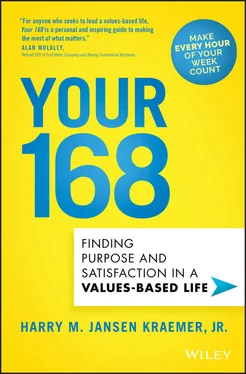So where do you find the time? You have 15 minutes, somewhere.
Most of us have to commute by train, bus, or car. You can devote some of that time to self-reflection. If you exercise, you can engage in self-reflection on the stationary bike, elliptical, or treadmill or while you're jogging. If you pray or meditate, you're already beginning the practice of self-reflection. These times can help you reflect on what really matters to you and why.
To be clear, self-reflection is not self-absorption. You're not contemplating the cosmos—or your navel. You're asking yourself some probing questions that give you clarity on how you want to allocate your 168 hours and keep you accountable for how those hours are being invested. When you engage in self-reflection for the first time, you need to establish a baseline for yourself. You need to slow down, turn off the noise, and be by yourself. There are some basic, yet very important, questions to ask yourself, such as these:
What are my values?
What do I stand for?
What is my purpose?
What really matters?
As a daily practice of self-examination, I tend to self-reflect at the end of each day, after I've completed my work and I've had time with my family. By midnight or so, I've finished my phone calls and emails and I've had time to exercise. In those quiet moments, I take 15 minutes to reflect on my day. Sometimes, I'll take a half hour or longer, depending on what is going on in my life. This dedicated time for self-reflection has become a habit like brushing my teeth. For me, it is the perfect way to end my day and to give myself clarity and a way forward for the day ahead. For example:
What did I say I was going to do today, in all dimensions of my life?
What did I actually do today?
What am I proud of?
What am I not proud of?
What would I do differently if I could live today over again?
Knowing what I know now, how will I act tomorrow?
You may ask similar questions, or they may be very different depending on your priorities, values, and circumstances. Ask yourself questions that are most relevant to you. It may be worthwhile to record your reflections in a journal, especially to review your thoughts later. I find this extremely helpful, because writing down my self-reflection not only increases my self-awareness but also provides a structure that keeps me from slipping into daydreaming. Day after day, my self-reflection journals provide a record of where I am and what I'm thinking at any given time.
The more frequently you self-reflect, the more you'll already know your values, your purpose, and what really matters. This will enable you to spend more time on the questions that keep you accountable to yourself for how you're living your life. But that won't happen if you're trying to do ten things at once. Take some time to think about these questions to put your life into perspective. As you prioritize, you'll separate activity and productivity. What seems infinitely complicated can be broken down into discernable parts to be addressed and dealt with in a reasonable way. Or, as I like to say, I can get from the roots to the trees to the forest!
MY SELF-REFLECTION JOURNEY
Although self-reflection is a major part of my life, it was something I had to learn. I am very fortunate that I had experiences when I was young that introduced me to the kind of thinking about myself and the world that I practice today as self-reflection. I can remember being seven years old and walking around Central Park in New York City with my maternal grandfather, Farrell Grehan. He was a history teacher and would discuss historical figures and important events, all the way back to the times of the ancient Greeks and the Roman Empire.
One day I asked, “Grandpa, why are there always wars?”
He replied, “Harry, since the dawn of humankind, people have killed each other. Part of it is that people don't take the time to listen to one another and don't reflect on how short of a time they're on this earth. Therefore, they're only after power and wealth, things that are very temporary.”
My grandfather would look down at me and say, “It was only a blink of an eye ago that I was a child like you.” That always seemed incredible to me. I began to grasp what he meant when he said, “We're here for a very short time.”
As I got older, I began to think more about the shortness of life and what I could do while I'm here. My father had a great line—he may have even stolen it, but he sure could deliver it: “Have you ever seen a hearse going to a cemetery with a U-Haul attached to it?” He always got a good laugh from that one, but beyond the punchline there was a serious message. Dad would say, “Most people must think they're either going to live forever or they're going to take all of this material stuff with them.”
I can remember when I was 13 years old and we were living in northeastern Pennsylvania. I was really into cars and liked to look at the front grilles and figure out their make and model. I'd see a particular grille and know the car was a Ford or an Oldsmobile.
Back in those days, there were big fields filled with junk cars that were sold for parts or scrap metal. One day, Dad and I were driving past a big flatbed truck carrying a huge stack of flattened cars. Dad looked out the window and asked me, “What's the grille on the third one from the bottom?”
“That's a Mercedes,” I replied.
Dad shook his head. “You know, about ten years ago, some guy bought that car and was so proud of it. He'd always park it at the very end of the parking lot so no one would put a ding in the door. Didn't matter if it was raining, he'd be the farthest from the door so nothing would happen to his car. And now look, that same car is flat as a pancake on the back of a flatbed truck.”
That made quite an impression on me. Dad wasn't against material possessions and neither am I. You work hard, you do well, so you want to have a nice house and car. It's okay to treat yourself. But don't be possessed by your possessions. Self-awareness can help you discern what you need and why you need it—and, of course, what you don't need at all.
Another pivotal moment in my development as a self-reflective person was a conversation I had with my uncle, my dad's brother, who was a priest in northeastern Pennsylvania. Father Francis would come over to the house on Friday evenings (for a fish dinner, naturally), and afterward he would play pinochle with my parents. One night, when I was about 14 or so, I asked to speak with my uncle after dinner.
“There's something I want to tell you—I've been thinking about this a lot.” I took a deep breath. “I think I want to become a priest.”
My uncle was ecstatic. “Oh, this is great. You have a calling!”
I wasn't nearly as excited as my uncle. “You see, this is where I'm confused: I don't think I really have a calling. But every Sunday we hear that there is a serious need for more priests, and we pray for more people to join the religious orders. The fact is, we need more priests. And knowing my friends, trust me, we'd be in big trouble if one of them becomes a priest. If someone is going to pull the short straw here, it might as well be me.”
If my uncle felt disappointed, he didn't show it. Instead, he said to me, “First of all, it's pretty clear to me you don't have a calling. But if you live your life the right way, you can have an enormous impact on others.”
My uncle explained that, as a priest, he could affect only those who came to church, and as important as his parish was to him, it was a pretty small group. “But, Harry, if you end up going into business or teaching, you could influence so many more people. Through your example and behavior, you could make a positive impact on more people than you can imagine.”
Читать дальше












